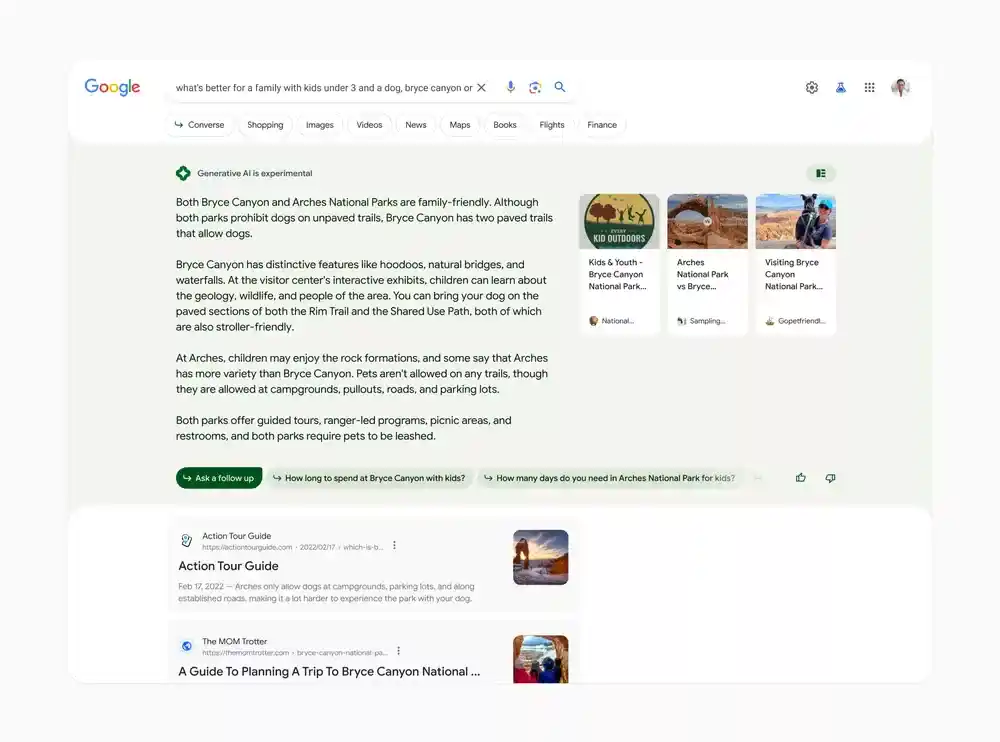Table of Contents
Google is taking a big leap forward in search innovation by testing a new feature called “Search Generative Experience” (SGE) in the US. This AI-powered tool automatically generates summaries for complex search queries, aiming to provide users with a more streamlined and informative search experience.
The key takeaway here is that unlike previous iterations, where users had to opt-in to SGE on the Search Labs platform, Google is now embedding AI Search Results within standard search pages for a select group of users. This approach allows them to gather valuable feedback from a wider audience, including those who might not be familiar with AI technology.
How Does AI Search Results Work?
Imagine you’re searching for “How to remove marks from painted walls.” Traditionally, Google would display a list of relevant websites. With AI Search Results, you might now see a shaded section at the top of the page containing a concise summary generated by Google’s AI and links to the sources. This summary aims to answer your query directly, potentially saving you time and effort in sifting through multiple websites.
Google emphasizes that it will only display AI summaries when it’s confident they provide a significant value proposition to users. This means that the AI-generated content must be demonstrably better than traditional search results in terms of accuracy, comprehensiveness, and clarity.
Google’s algorithms will consider various factors to make this determination, such as the complexity of the query, the ambiguity of potential search results, and the overall quality of the source material. By prioritizing high-quality summaries, Google aims to ensure that AI Search Results enhance, rather than hinder, the user experience.
Why is Google Testing AI Search Results?

There are two primary reasons behind Google’s test:
- Enhanced User Experience: AI Search Results have the potential to significantly improve user experience by acting as a multifaceted information concierge.
- Knowledge at a Glance: For complex or specific queries, AI summaries can provide immediate answers, saving users valuable time and effort. For instance, a search for “best hiking trails in Yosemite National Park” might be met with an AI-generated summary highlighting the top-rated trails, their difficulty levels, and links to detailed guides. This not only expedites the research process but also ensures the user is focusing on the most relevant information.
- Conceptual Distillation: AI Search Results are useful for simplifying complex technical or information-heavy queries. For example, if a user searches for “how does a combustion engine work?”, Google’s AI can analyze different sources and provide a concise summary that explains the workings of a combustion engine in easy-to-understand terms. This is especially beneficial for users who may not be familiar with the subject.
- Springboard for Deeper Dives: While informative, AI summaries always include links to the source material. This allows users to delve deeper into topics that pique their interest or consult the source directly for additional details and perspectives. In essence, AI Search Results streamline the initial research phase while still providing users with the necessary pathways to comprehensive knowledge.
The Future of AI Search Results
The inclusion of AI Search Results in Google’s test signifies a potential shift towards a more AI-driven search landscape. While the current iteration targets specific queries and user demographics, it opens doors for a future where AI plays a more prominent role in curating and presenting search information.
However, it’s important to note that user feedback will ultimately guide the future of AI Search Results. If users find the summaries helpful and informative, they could become a permanent fixture in Google Search. Conversely, if feedback is negative, Google might refine the tool or even discontinue it.
This test highlights Google’s ongoing commitment to innovation and its dedication to providing users with the most efficient and informative search experience possible. As AI technology continues to evolve, we can expect to see even more groundbreaking advancements in the way we interact with search engines.